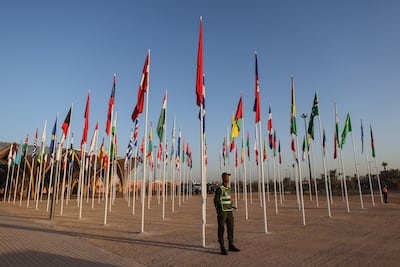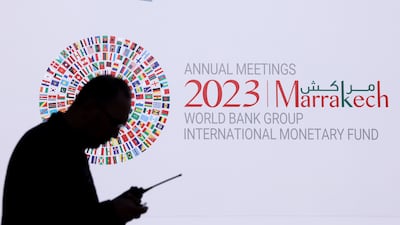The debt burden of developing countries has hit unsustainable levels that require durable solutions including cancellation of the debt piles of some of the poorest nations, the G24 has said.
The international government group of 24 developing nations has called upon the International Monetary Fund and World Bank to help bring down the public debt levels that are stifling growth in some countries.
“We call for immediate global action to assist developing countries to managing their escalating debt vulnerabilities,” Adama Coulibaly, Ivory Coast’s Minister of Economy and Finance, who is also the chairman of G24, said on Tuesday. He was speaking at a press briefing on the sidelines of the IMF and World Bank annual meetings in Marrakesh.
The G20 common framework for debt also calls for the cancellation of debt burden of most vulnerable and poor countries. Currently, most of the debt of these nations is owed to multilateral development banks, he said.
Global debt jumped significantly after the coronavirus pandemic hit in 2020, especially in the emerging and developing economies.
Most of these nations were already struggling with higher levels of debt and the slower pace of growth. The additional debt from Covid-19 added to their significant economic vulnerabilities.
Global debt reached $235 trillion last year, $200 billion above its 2021 level, staying above its “already-high pre-pandemic level”, the IMF said in a report in September.
Total debt stood at 238 per cent of global gross domestic product last year, 9 percentage points higher than in 2019, the report said.
Aggregate global debt climbed by $8.3 trillion in the first three months of 2023, the Institute of International Finance said in its Global Debt Monitor report in May.
At almost $305 trillion, global debt is a shade under the $306 trillion recorded in the first quarter of 2022, the IIF added.
The increase marks the second consecutive quarterly jump in global borrowing, following two quarters of sharp decline during rapid monetary policy tightening last year in countries around the world.
“More than half of low-income developing countries are in or at high risk of debt distress, and about one-fifth of emerging markets have sovereign bonds trading at distressed levels,” the IMF said in last month's report.

The lender recommended that governments should take urgent steps to help reduce debt vulnerabilities and reverse long-term debt trends.
However, the G24 chairman on Tuesday said the global community, including multilateral lenders such as IMF and World Bank, need to step up their own efforts to deal with the debt vulnerabilities in the developing nations.
Mr Coulibaly called for a review of the IMF’s surcharge policy, saying, “it's a huge financial burden for countries at a time of economic uncertainty”.
The group also called for the timely completion of the 16th review of the IMF quota system including an agreement on a revised formula to shift quotas from advanced economies to dynamic emerging markets and developing economies.
Such a move, he said, will “better mirror their increasing influence in the global economy, while safeguarding the representation and voice of impoverished nations”.
With the economic landscape remaining uncertain across the world, many countries are affected by declining access to finance amid higher interest rates and rising inflation, the G24 said in a separate communique on Tuesday.
Steps to make financing available to developing countries would ease some of the pressure that has built up in recent quarters.
Member countries asked for reforms of IMF short-term financing instruments and allocation of increased concessional resources.
“Member countries were of the view that these recommendations would provide additional financing for members to mitigate shocks and invest in climate action and sustainable development,” the communique said.


